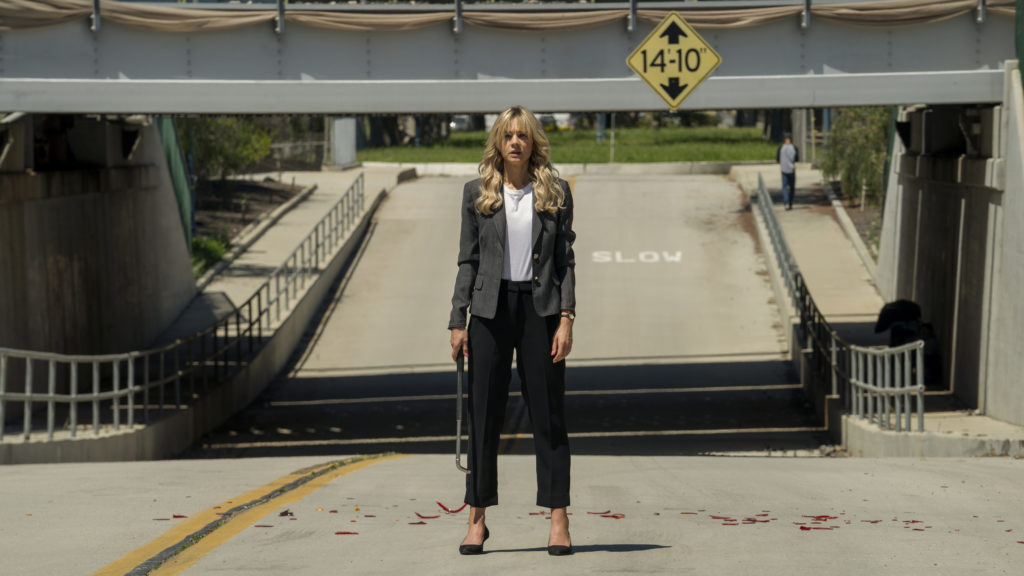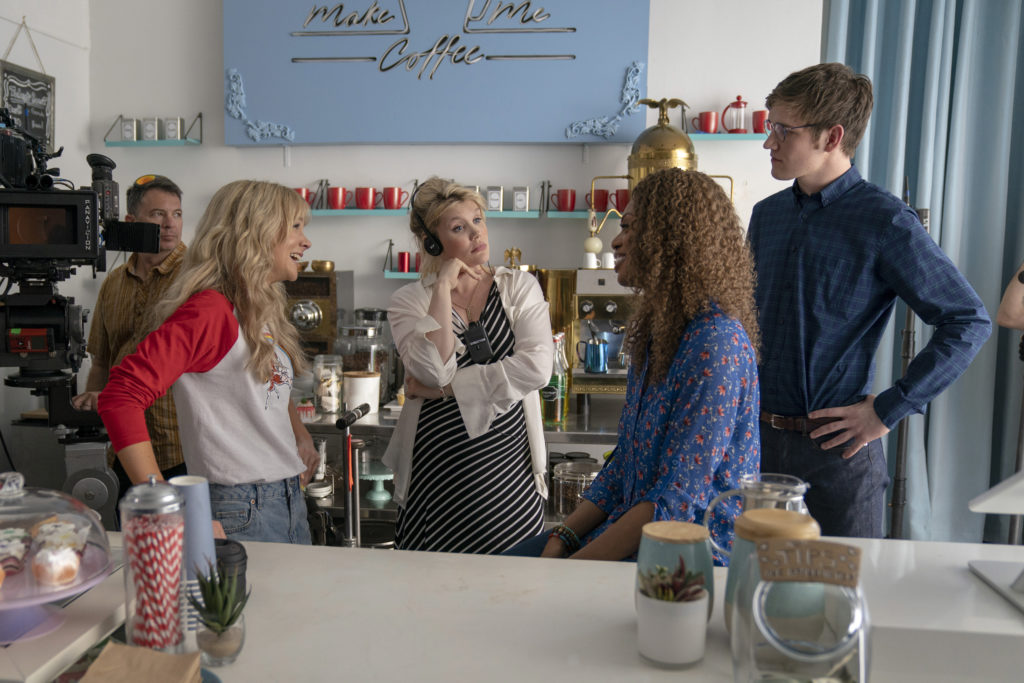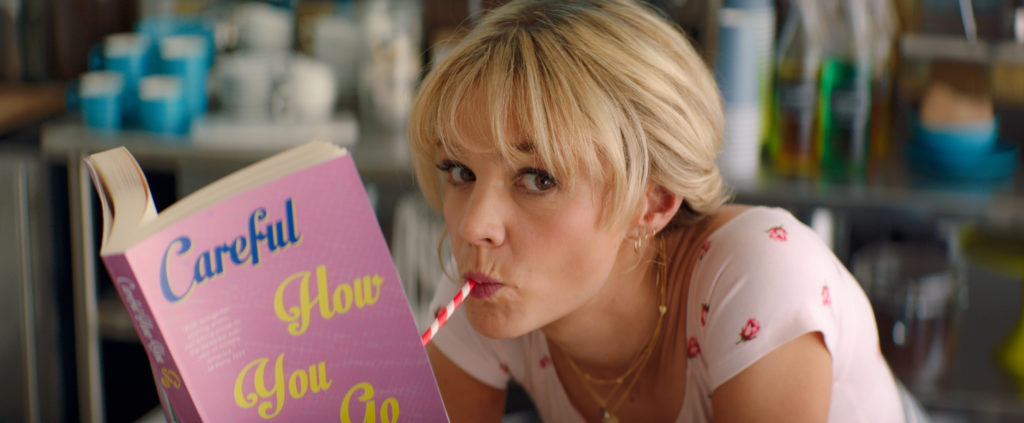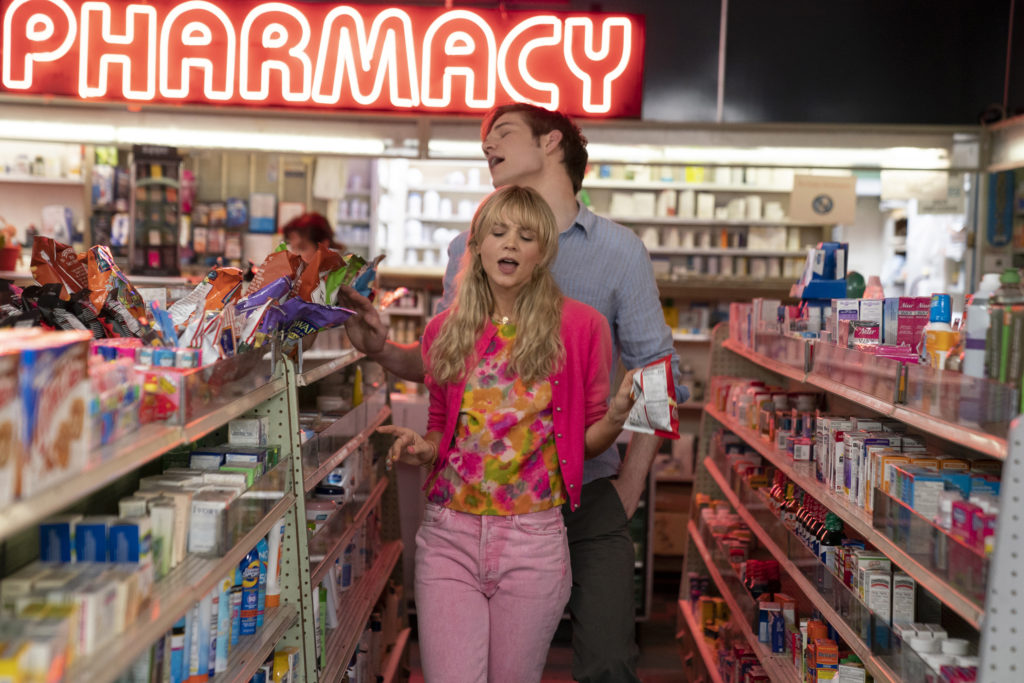“Every week I go to a club. I act like I’m too drunk to stand. And every week a ‘nice guy’ comes over to see if I’m OK.” So speaks Cassie of Promising Young Woman, the debut feature of writer/director Emerald Fennell. Years ago, Cassie dropped out of med school following the assault of a friend; now her weekend hobby is showing an endless parade of dudes how very, very wrong they are in taking a “drunk” woman home and trying to get into her pants. But there’s a twist: the arrival into her life of ex-classmate Ryan (Bo Burnham) brings the possibility for healing, along with unresolved feelings about the event that left her traumatized. A new mission emerges.
Candy-colored and unabashedly girly in its aesthetic, Promising Young Woman offers a welcome take on the revenge thriller, switching out the raw violence common to the genre for a more nuanced interrogation of the pervasive culture of sexual harassment. In advance of the film’s April 17 release from Focus Features, Fennell took the time to speak about her debut feature—starting with an unabashed love-fest for her lead actress.
Congratulations on the film. I’ll see Carey Mulligan in just about anything. So I was excited for this, and it didn’t disappoint.
Oh, she’s amazing.
I read somewhere that you thought there was no way in hell you’d get her for this film.
Oh God, no, of course not! She’s Carey Mulligan! She’s incredibly selective about what she does and who she works with, so I really didn’t think I stood much of a chance. Luckily, I somehow managed to persuade her. And I’m so, so glad, because I really do think she’s the backbone of all of this. She grounds the characters in such truth. It’s a heightened movie, and it’s a heightened experience, and it needed that.
That’s one of the things I like about the film: its groundedness. You see Cassie wrestling with her trauma and trying to get better, as opposed to just going on a killing spree.
The revenge movie is a genre that I absolutely love, but I think it’s also ripe for subversion. Also, I don’t know any women who resort to violence, really. It’s very rare. And so I wanted to write a revenge movie that was honest about the process of grieving and the process of trauma. And also honest about how a woman might teach lessons or frighten people. What she does is still very dangerous to herself, and I think possibly that might even be part of why she does it. It struck me that I’d never seen a movie like this with a character who felt like she might do something that a real woman might do.

So many revenge movies are escapist, in a way. Men get away with awful things all the time in the real world, and in revenge movies, they get brutally murdered for it.
It’s escapist, and it’s cathartic. And it’s effective. But it’s not honest or real. This movie was about taking those things that are so appealing to us as audience members—so neat and tidy—and pulling them apart and looking at them. For me—the same as in Killing Eve—if you’re going to have violence in a movie, you need to be honest about what violence looks like and what it is. You have an obligation to show it in a way that feels real. We’re so immune to violence. When you show what it looks like, really, it’s much more uncomfortable than the almost titillating violence that I think we’re used to on TV and in film. [Fennell was the show runner and head writer for season two of the acclaimed BBC show Killing Eve.] There’s a scene in Killing Eve when Eve kills for the first time with an ax. It’s kind of horrific. I just didn’t want it to be a moment that was like, “OK, gun, fine.” Imagine actually killing someone with an ax as a woman who’d never killed someone before. It’s always looking at these things that we’re used to and saying, “OK, what actually would you feel like?” I don’t think it’s too much of a spoiler to say that when there is violence in this film, it is troubling. As it should be.
Some of the things that Cassie does are uncomfortable to watch. You’re like, “No, no, what are you doing?”
The power that women have is to frighten. That’s what she does. She is frightening. I didn’t want to shy away from that, from the fact that some of the decisions she makes aren’t nice or good. Because she’s so angry. But it was important to me nevertheless that things aren’t quite what they seem, that she’s very particular and careful about the smoke and mirrors that she puts in place.

The rape culture scenarios this movie confronts—I don’t want to say they’re in the “gray zone,” because they are absolutely wrong, but they’re these situations where a lot of people still look at them and say, “Well, no, that wasn’t really rape. She was just drunk.”
This conversation has been going on for a really long time. It’s still something that is completely pervasive everywhere. It was really important to me, making this film, to first say, “Where have I contributed to this culture? What jokes have I laughed at? What movie scenes have I laughed at? How have I not supported friends in ways that they may have needed supporting?” If you’re going to make a film about this kind of stuff, you have to really look at yourself first.
Every single person in this film thinks they’re right. Even the really bad people who did the really bad thing [to Cassie’s best friend]. The thing that was important to me was that nobody is arguing that the bad thing [didn’t happen.] They just interpreted it very, very differently. They say it was consensual and fun. And isn’t that always the case? It’s something I was really interested in: So rarely do people say, “No, that didn’t happen!” They say, “Oh, no, it did happen, but not like she said it did.” And that’s very important. When writing it I had to make sure that none of the bad things that happen in this film we haven’t laughed at in comedy movies of the last 15 years. Jokes about girls being drunk or taking dogs home.
The truth of it is that you also have to be open-minded and forgiving, as well. Our culture changes, and we change with it. That’s how everything gets better. This film is about people who refuse to admit and refuse to change. Cassie comes along, and she has two hands open. One has forgiveness and one has punishment. And she always offers both at the beginning. Every conversation she has with people, she’s offering forgiveness if they acknowledge and apologize.
Are you having these conversations with your actors?
Totally. Everyone who really wanted to be a part of this movie was very open and honest. And I think everyone who’s seen it, and everyone who’s read it, was like “Oh, God. Oh, shit. This is so much a part of the culture.” We all had really proper, nuanced discussions about it. But the thing for me with everyone was: You are not a bad person. You woke up this morning knowing in your heart you are a good person. And somebody has turned up and is telling you you’re not. So what do you do? What would any of us do in that situation? It could be about anything. It’s being confronted with a truth that you’re not willing to recognize. And that is true just as much for Cassie. Because when she’s confronted by something she’s done, you can see the horror. She’s not immune to it.

Was there a particular event that led you to write this film? Or was it a culmination of all these discussions that have been taking place over the last handful of years?
It wasn’t inspired by [the last few years], really, because I started writing it before. It’s something that my friends and I had been discussing since we were at college ourselves. The curtain’s been opened, and the light’s shining on how pervasive this culture is. It’s something I’ve been very, very interested in for a long time. Particularly this idea of one specific part of our culture, which is the use of alcohol and drugs in seduction, which remains still a huge part of the way that people operate. People who would never think themselves bad people. I was wanting to make a film that would be compelling in its own right, but also underneath would want people to examine something deeper.
It’s definitely a discussion-sparker. I assume, so far where it’s screened, it’s done that?
Yeah, it has. Also, from a filmmaking point of view, it’s been really interesting seeing how people interpret different facets of it: the set design, the music choices, the casting, the costume design. All this is stuff that we really, really put such great, great care in. What’s so nice is people have really responded to this stuff as well. And that’s nice, because it’s the stuff of making things that’s so pleasurable, as well as obviously writing the script and telling the story.

I’ll be honest: When I watched the trailer, a lot of those design elements—the colors, the music, the girly aesthetic of it—made me think it would be a different film than it was. I liked what I saw! But it was a lot more nuanced than what I expected it would be.
The whole idea of the movie was to beckon people in. Beckon and beckon them into a sort of fun, schlocky [atmosphere]. And then lock them in! And not let them out. That’s the experience I want when I go to the movies—to be surprised and challenged in every way.
For me, what I was trying to do was to have that sense of things dawning on us at different times. It’s seeing people suddenly realize that they’re listening to Paris Hilton [her song “Stars are Blind” is featured in a scene] or recognizing [a] Britney Spears [song], slowed down. The clothes seem so enticing and feminine. But actually, they are hiding something incendiary and frightening. [Cassie is] actually using them as a clever disguise. I wanted it to be surprising. For my personal taste, I like things that are ultra, ultra, ultra-feminine, but also kind of uncanny. Also a bit odd or too much.
What are some of your favorite movies that have surprised you in that way?
Most recently, Get Out and Parasite, for their sense of “I really don’t know where this journey is going, but I’m loving it.” Films like American Psycho and To Die For. Macabre humor that looks beautiful. Anything by Paul Thomas Anderson.
Trojan horse cinema.
That’s it. A Trojan unicorn. That’s the best, all of it! The kind of woman that Cassie is projecting is the ultimate Trojan horse. She uses her blondness and her whiteness and her sweetness to a very clever respect, which makes her very dangerous. I’m interested in the way that woman can be dangerous.
The post Promising Young Women: Emerald Fennell Directs Carey Mulligan in Focus Features’ Candy-Colored Thriller appeared first on Boxoffice.
from Boxoffice





0 comments:
Post a Comment